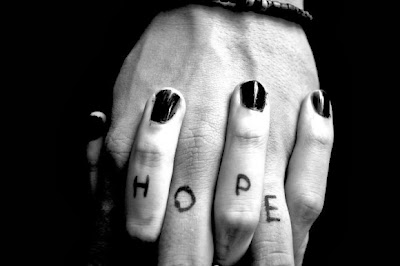10.03.2013
Hope Within Imperfection
Within each of us is a belief that the future holds something bright. This belief can be something that gets us up in the morning. It propels us to keep “moving forward.” We all want to believe is a brighter future. However, there might be something that says to us, that if the future is the place where the light is, what am I living in now?
Within each of us is a desire to “fix” our lives. So we read, “Five steps to a happier you” books. We fall into the latest diet trends. Then, Cosmo tells us 26 new sex positions to obtain the perfect sex life. And, after every book, magazine, exercise, and practice, we come to two conclusions:
I’m tired.
I’m not in control.
I have had the privilege of working with four mentally disabled for the past six years of my life. Some of them have struggles walking because of balance. Some of them struggle with the bathroom. Some of them need help brushing their teeth. They need help with medications, their banking, making food. Life has struggles. They might be able to get slightly more efficient, independent, or capable of doing these things. But, the reality is, life has struggles. And, what the disabled teach us is to surrender and accept our struggles. Sometimes, we can get slightly more efficient, independent, or capable. Sometimes, we just need to accept that we are powerless and we are not in control.
That feeling of being powerless and not in control is an awful one. From an early age, we are taught that in order to be acceptable we are taught that we need to control our behaviors and conform to a certain behavior and image. We are taught to tame and control our behaviors, feelings, actions, and thoughts to fit this ideal. Unfortunately, we can’t be in control all the time. I can’t control everything I do. I can’t control everything everyone else does. And, if the definition of functional is being able to perfectly manage and control my life and outcomes, I am dysfunctional.
The good news is that there is a God who doesn’t expect us to be perfectly functional. The God that we worship says, “Come to me as you are and I’ll love you as you are.” The God that we worship offers us grace. And, grace is the love that heals the wounds of dysfunction. This God says, “I embrace your messiness. I embrace your failure. I embrace your pain. I embrace the parts of you that you feel like are dying inside, because, I will use those places to offer my healing and new life for others.”
While the future may be brighter in the future because we feel like we can control our destiny, hope is mostly found in the loving presence of a God, a friend, a significant other, or whoever allows us to accept the dysfunction inside of us. Hope is someone who loves you in your darkness. Hope is someone who accepts the parts of you that you find unacceptable. In the case of one of my mentally disabled friends (who happens to be 300 pounds), hope looks like allowing me to check him for hemorrhoids and see if I need to apply medication.
Photo Source
Source: The Actual Pastor by Mike Friesen
Subscribe to:
Post Comments (Atom)

No comments:
Post a Comment